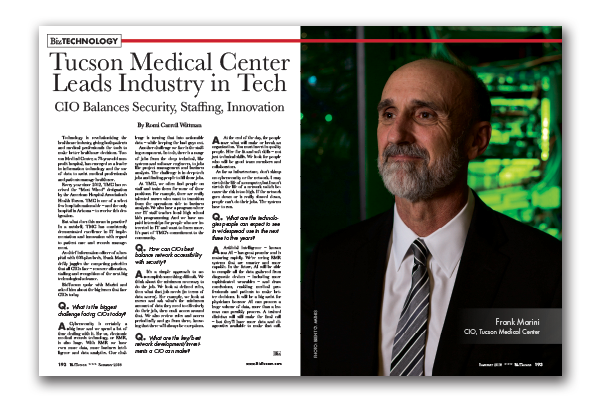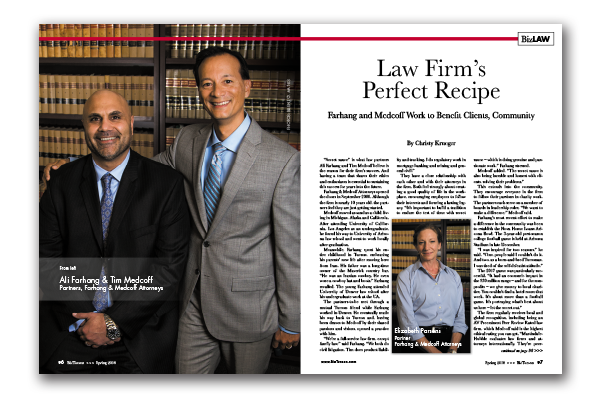
Q&A with Tony Penn
By David B. Pittman –
Tony Penn, president and CEO of the United Way of Tucson and Southern Arizona, is the 2014-15 chairman of the board of the Tucson Metro Chamber.
Penn arrived in Tucson in May 2010 to take the helm of the United Way, which was mired in debt and management difficulties. Penn proved to be a masterful turnaround artist, erasing a $2 million debt.
Penn also streamlined the organization by reducing full-time United Way employees from 75 to 52, curtailing the cost of doing business from 18 cents of every charitable dollar raised, to a dime per dollar.
In fact, an analysis done in 2013 measuring 25 different statistical categories rated Tucson’s United Way among the top five United Way organizations – no small feat considering there are 1,400 United Way branches in 41 countries.
Tucson’s United Way partners with more than 80 charitable agencies to help more than 100,000 people annually in the areas of education, financial stability and access to healthcare. In 2012-13, more than 13,000 employees from nearly 300 companies invested in the United Way, surpassing its $10 million fundraising campaign goal by nearly $147,000.
Before moving to Tucson, Penn was a senior executive for the YMCA in San Antonio for eight years. He also worked 23 years at Teradyne Corp., a large, high-tech designer and manufacturer of automatic test equipment, where he rose from field engineer to regional manager.
A U.S. Air Force veteran, Penn graduated from the Southwest Leadership Program of the University of Arizona’s Eller College of Management. He also earned certificates from the University of Texas and the Executive Education program at Harvard Business School. Penn is a board member for Tucson Regional Economic Opportunities.
Q. What is a nonprofit CEO doing chairing the Chamber of Commerce anyway?
A. The fact is the people I enjoy advocating for every day are not the folks who are standing on the side of a road with a sign. The folks I enjoy working for are at the bus stop at 5 a.m. going to their first job. Those folks really need our United Way. They aren’t looking for a handout – they’re looking for a hand up. They’re hardworking people that want more and better jobs to lift their families.
The Chamber is all about strengthening the local economy and creating the best environment possible for economic development. It is about retaining major employers and assisting small business so both can grow and hire more people. The Chamber is about improving workforce readiness, increasing high school graduation rates and endorsing pro-business public policy.
Improving Tucson’s economy is good for everyone. It means more jobs, higher wages and a larger tax base. It means more money for schools and roads and charitable giving. A growing economy benefits everyone.
Being on the board of the Chamber is something I aspired to because every successful community I’ve lived in has had two things – a successful United Way and a successful chamber. When I arrived in Tucson we couldn’t make that claim. Our Chamber was not where it is today. No knock on any previous administration or individual, but we are leaps and bounds ahead of where we were four years ago. Under Mike Varney’s leadership, there has been an infusion of participation at the Chamber.
Q. You and Michael Varney both took jobs where you faced some difficult situations around the same time. Have the two of you ever discussed that?
A. Yes, more than a couple of times. We were both able to manage in very challenging circumstances and create the turnaround necessary to strengthen the organizations we represent.
Q. What steps did you take to turn around the United Way?
A. It began with communications and image development. When you have a bump in the road, it is crucial to face the music. I was willing to talk to any group that would listen. I titled my presentation “The Elephant in the Room.”
The second step was strengthening our board. We needed to make it more reflective of the community and ensure all the necessary skill sets needed were represented. We’ve done both.
The third step was reducing the costs of doing business. We’ve cut business expenses and are running a tight, taut ship.
The fourth step was great financial development. Not only have we validated to the community that we’re efficient, we’ve also validated our performance through outcome metrics, which measure how effective we are in making positive transformation in the lives of children, families and seniors in our areas of focus.
We have high expectations of our partners to do likewise. United Way has a great track record of building a “collective impact” in communities. “Collective impact” is a phrase we like to use. It is about creating positive transformations cost effectively. United Way’s business orientation and its use of volunteers is a huge part of its magic.
Q. What would you like to accomplish during your tenure as chairman of the Chamber board?
A. I believe that while business needs community, community also needs business. In my humble analysis, we need greater alignment between the various chambers and other business and economic development groups, such as TREO and the Southern Arizona Leadership Council.
We’ve also got to have cross-sector coordination with other major economic interests, such as large healthcare and educational institutions. For these discussions to be successful everyone would have to check their guns at the door and be willing to give a little. This is what we need to start the ball rolling. It is something I will work to accomplish.





